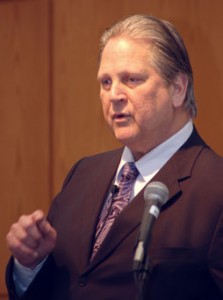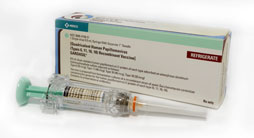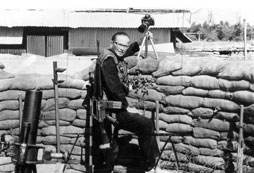By André Green/se news editor

Members of the Arlington community ate a heart healthy dinner of lean beef tips and chocolate-dipped strawberries last week on SE Campus while learning about health concerns in their city.
Health Care: Key Issues, sponsored by the Fort Worth Dietetics Association Feb. 22, focused on health care problems affecting all citizens.
Arlington Mayor Robert Cluck informed audience members of the dangers facing the community, chief among them, the quality of the air.
“ The Dallas/Fort Worth area is the second highest polluter in Texas behind Houston,” he said.
As air quality decreases, health problems increase, Cluck said. The results are apparent in hospitals throughout the metroplex, especially when factoring in Texas summers.
The heat mixed with large amounts of pollution in the air forms a deadly combination.
Ozone alerts are triggered when the air quality becomes too poor and could seriously affect individuals susceptible to respiratory ailments, Cluck said.
Between 2002 and 2004, Tarrant County had 59 Code Orange (unhealthy for sensitive groups) days.
“ When the temperatures go above 95, people have even more problems,” he said. “The risks of heart attacks increase with the decrease in the quality of our air.”
As a result, Cluck turned to the American Heart Association, the Arlington Fire Department and the UTA School of Nursing to counter the growing epidemic.
The solution was CPaRlington, a program designed to train more than 10 percent or 36,000 of Arlington’s residents in cardiopulmonary resuscitation by 2010.
An individual suffering from cardiac arrest, on average, has approximately three minutes to have CPR performed before irreversible brain damage sets in.
“ It takes three-and-a-half to four minutes for our first responders to arrive on scene,” he said. “It’s true, you aren’t certified. But if I go down, I’m not asking for a certificate.”
Pollution can also contribute to a rise in cancer diagnoses.
“ In the past, 99 percent of the people with lung cancer were found to be smokers,” he said. “Now 20 percent have never smoked, and that is an attribute to the poor air quality.”
Cluck called the issue a “matter of life and death” and said something has to happen to improve the air quality within the next few years.
Several major Texas cities, including Arlington, do not meet federal ozone standards.
“ By the year 2010, we will face stiff fines,” he said. “And we should.”
Cluck lauded the efforts of Texas mayors who campaigned against fast-track permitting spearheaded by Gov. Rick Perry and the Texas Commission on Environmental Quality.
The plan called for 17 conventional coal-fired power plants to receive faster permits without thoroughly evaluating the impacts they might have on the environment. Opponents to the plan want plant developers to seek environmentally friendly ways to produce the energy.
Cluck said he is not against coal energy; he would like plant developers to seek safer means to produce it.
“ It’s time for all of us to find out how to produce power without hurting people,” he said.
Although it has not become a major issue as of yet, H5N1 or Avian Flu readiness is another health concern.
“ So far it has been contained,” he said. “The fear is it will mutate and sweep the world.”
The city’s plan to battle the pandemic involves what most people subscribe to when they fall ill: stay at home. Disaster planners estimate the city would lose about 40 percent of its workforce.
The best way to fight, contain and control the spread of Avian Flu would be through special masks and isolation, Cluck said. Additional instructions would be available via television, Internet and radio.
Cluck said the solutions to making Arlington cleaner included mitigating congestion and introducing mass transit to the area.
Even though voters have denied public transportation in the past, Cluck said he believes the way to go is through a rail-based system.
“ Anything to mitigate congestion will help,” he said. “The idling engine is our biggest source of pollution.”
Prior to his election as mayor, Cluck was in private practice as an OB/GYN in Arlington amassing more than 30 years of experience. He is currently vice president for medical affairs at Arlington Memorial Hospital.
The dinner was a departure from the Dietetic Association’s first meeting.
“ The inaugural program focused on dieticians,” FWDA President Paula Cantu said.
Cantu said the format was changed to include more of the community and bring awareness to health care issues that face everyone.
“ We wanted to bring in people that were in the community and relate their information to a broader audience,” she said.
All proceeds from the banquet will benefit the Texas Dietetic Association Foundation scholarship program.
For more information on CPaRlington, visit www.ci.arlington.tx.us/fire/CPaRlington.


























